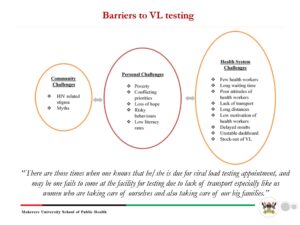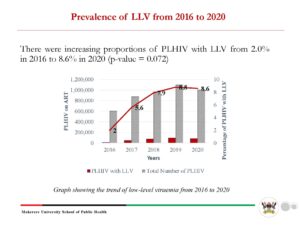Exploring Uganda’s Studies on Low-Level Viremia: LabCoP’s Insights from the February ECHO Session

The February ECHO session, facilitated by ASLM’s LabCoP project and moderated by Francis Ocen, LabCoP Project Manager, centered on the exploration of studies conducted in Uganda concerning low-level viremia (LLV) during antiretroviral therapy (ART). Delving into three distinct studies, the session aimed to offer comprehensive insights into LLV, its prognostic implications, and effective interventions geared towards enhancing individual treatment outcomes.

Despite significant progress in HIV and AIDS research and intervention implementation, the global HIV population stood at around 39 million in 2022, with approximately 630,000 AIDS-related deaths that year. The shift in viral load testing recommendations in 2013 from a binary categorization (suppressed or non-suppressed) to a three-way categorization (undetectable, suppressed but detectable, and un-suppressed) highlighted the existence of LLV in virally-suppressed clients. LLV, defined as ranging between ≥50/ml and ≤999 copies/ml, poses challenges in prognosis and necessitates a deeper understanding of interventions.
Dr. Nanyeenya Nicholus, Program Officer at the National Health Laboratories and Diagnostic Services, Ministry of Health, Uganda, presented the findings of three LLV studies conducted in Uganda between 2016 and 2020. The studies aimed to determine the association between LLV and viral load non-suppression, understand perceptions of LLV among PLHIV and healthcare providers, and evaluate the effectiveness of intensive adherence counseling (IAC) in managing LLV.

Key findings included an increase in LLV from 2% in 2016 to 8.6% in 2020, with 1 in 10 PLWHIV becoming non-suppressed during the follow-up period. Recommendations to the Uganda Ministry of Health included a review of the viral load testing algorithm, implementation of interventions for LLV management, and influencing other similar settings. Additionally, efforts to raise awareness about LLV among healthcare workers and PLHIV were emphasized, along with the implementation of IAC as an effective intervention.
Lara Vojnov, Chief Scientist and Independent Consultant for The Global Health Impact Group, emphasized the importance of understanding the implementation of dolutegravir-based regimens, known for their effectiveness and high resistance barrier, in LLV studies.
The session received positive feedback, shedding light on the impact of LLV on individuals living with HIV. For further details on LLV and the Uganda studies, the full LabCoP ECHO session recording is available here.
